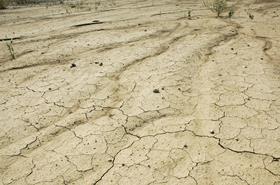
A new EU study has suggested that the effects of climate change could reduce the economic value of European farmland by up to 32 per cent.
Farms in southern Europe are particularly sensitive to climate change and could suffer value losses of up to nine per cent per 1°C rise.
The study by Steven Van Passel, Emanuele Massetti and Robert Mendelsohn, entitled‘A Ricardian Analysis of the Impact of Climate Change on European Agriculture’,concludes that policy – on water and land use, for example – will be crucial to help farmers adapt to climate change and mitigate economic losses.
A range of scenarios
The EU-funded researchers matched climate, soil, geography and regional socio-economic variables with the farm-level data using ‘Ricardian analysis’ – a statistical method that estimates the relationship between the value of agricultural land and climate.
The Ricardian method considers the productivity of land (its annual net revenue); how climate affects crops; and how climate influences the choices of farmers, such as which crops to grow.
The possibility of both small and large changes in temperature and precipitation are reflected in the study and predictions are based on a range of different climate outcomes for 2100. Three ‘General Circulation Methods’ were used, representing severe, moderate and mild climate change scenarios, respectively.
Under this model, it was calculated that an increase of 1°C across all farms by 2100 would increase farmland value by 8.2 per cent (€482 or £417 per hectare), while an increase in rainfall of 1 cm/month would increase value by 2.4 per cent (€143 or £124 per hectare).
Southern Europe hit the hardest
The effects of these changes differ widely between countries. Small increases in temperature are harmful in southern Europe, for example, but beneficial in northern Europe. Similarly, a small increase in rainfall would benefit most European countries, but not those in Scandinavia.
Impacts predicted by the climate models ranged from a five per cent value gain (if climate change is mild) to a 32 per cent loss (if climate change is severe). Overall, the changes predicted by the climate scenarios would be harmful to agriculture in Europe.
The impact appears to be more severe in southern Europe, which was adversely affected in all cases. Italy showed the largest loss of value, losing €120 billion (£104bn) if climate change is severe – a 71 per cent reduction in farmland value.
Using the two milder climate scenarios, though, some countries in northern Europe appear to benefit from climate change.
Even within regions, the effect is not uniform. In Finland, for example, agriculture benefits from warming in some seasons but is overall harmed by rising winter temperatures.
How policy can help
The researchers suggest that policy could have a large impact on these future scenarios. Governments can support the development of new technologies, crops and breeds.
They are also responsible for regulating water – a major agricultural input – and how land can be used. Changes in government policy in these areas could, therefore, help farmers adapt to climate change and avoid major losses.
The study estimated these effects using farm-level data rather than crop models, which describe how climate affects specific crops, but omit impacts to livestock and underestimate the ability of farmers to adapt.
The data, obtained from the Farm Accountancy Data Network, contains information gathered in 2007 at over 41,000 farms across the EU15: Austria, Belgium, Denmark, Finland, France, Germany, Greece, Ireland, Italy, Luxembourg, Netherlands, Portugal, Spain, Sweden and the United Kingdom.



